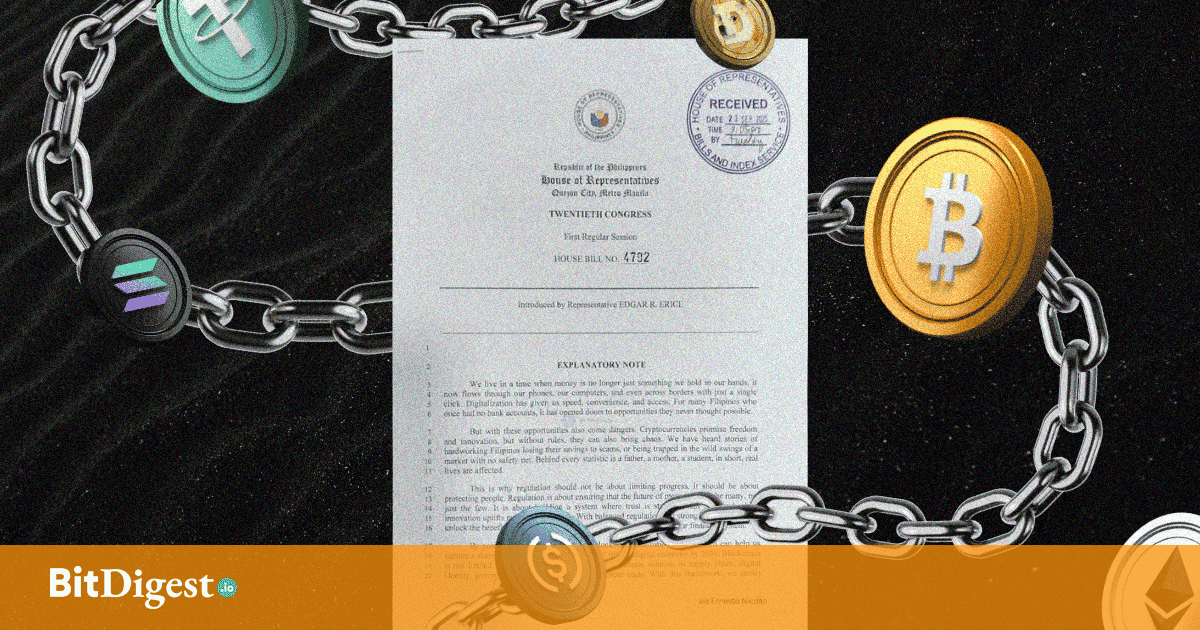Caloocan Rep. Egay R. Erice’s House Bill No. 4792 to Streamline PH’s Token and Crypto Economy
Caloocan Representative Edgar R. Erice has filed House Bill No. 4792, the Philippine Tokenization and Crypto Adoption Act, establishing a national framework for the country’s emerging digital asset economy. The measure creates the National Crypto and Digital Assets Technology Institute (NCDATI), an inter-agency council led by the BSP, SEC, DICT, and DTI to set standards for tokenized assets, sandboxes, and compliance. Beyond regulating cryptocurrencies, the bill treats tokenization as infrastructure—applicable to trade, supply chains, digital bonds, and public services. It directs DICT and DOST to develop open standards for tokenization protocols, aligning with the Philippines’ broader digital transformation and inclusion goals.
As blockchain-backed transparency bills in the senate and house gain ground in the Philippine public governance framework, the House of Representatives is now laying the groundwork for the broader Web3 economy. House Bill No. 4792, officially titled the “Philippine Tokenization and Crypto Adoption Act,” filed by Caloocan Rep Edgar R. Erice, signals a maturing shift in legislative priorities: from merely tracking pesos to redefining how digital value flows across sectors.
The bill aims to enable and regulate asset tokenization—“the digital representation of ownership rights to real or intangible assets”—and using these to support commerce, inclusion, and secure digital transactions. The scope is wide: it includes real-world assets (RWAs), tokenized commodities, digital bonds, and decentralized financial systems, while making room for regulated digital currency systems and digital identity infrastructure.
The measure proposes to create a National Crypto and Digital Assets Technology Institute (NCDATI), under which a multi-agency council—composed of the Bangko Sentral ng Pilipinas (BSP), Securities and Exchange Commission (SEC), Department of Information and Communications Technology (DICT), and Department of Trade and Industry (DTI)—will be responsible for crafting and updating the standards and sandbox rules for tokenized transactions. The same framework will govern future oversight on matters of data privacy, cross-border interoperability, taxation, and consumer protection.
Unlike earlier attempts to narrowly define “crypto” as speculative or high-risk financial assets, HB 4792 approaches tokenization as a neutral infrastructure layer, a platform on which real-world applications can be built. The bill names supply chain management, cross-border trade, intellectual property tracking, and real estate transfers as among the many areas that can benefit from token-based systems.
Critically, the bill places strong emphasis on public infrastructure. It directs DICT and the Department of Science and Technology (DOST) to establish open standards for tokenization protocols—especially for use in public services and micro-economy programs. This aligns with broader digital transformation goals within government, and mirrors how other countries have been piloting real-world asset tokenization to improve efficiency and reduce fraud.
While the bill is still in the early stages, it represents a marked evolution in blockchain policymaking. What started in the Senate as a move to secure the national budget through a permissioned blockchain now finds its complement in a lower house effort to institutionalize token economies. And unlike earlier, isolated blockchain resolutions, HB 4792 seeks to position tokenization as a national strategy, one that is both sector-neutral and innovation-forward.
In other words, this isn’t just about crypto adoption. It’s about recognizing tokenization as a digital primitive, capable of transforming ownership, access, and participation in both public and private ecosystems.
As regulatory attention continues to grow, the real challenge will be execution: Can the Philippines craft laws that both enable innovation and secure the public interest? HB 4792 is a step in that direction, but like all infrastructure, its value lies not in theory, but in what future systems can be built on top of it.
.svg)


.svg) SHARE TO FACEBOOK
SHARE TO FACEBOOK SHARE TO TWITTER/X
SHARE TO TWITTER/X SHARE TO LINKEDIN
SHARE TO LINKEDIN SEND TO MAIL
SEND TO MAIL



.svg)


.svg)